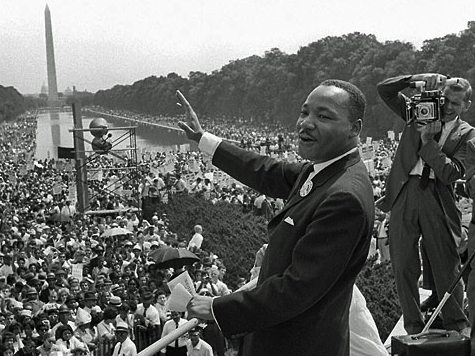The passing of Nelson Mandela last month sheds new light on the anniversary of the birth of Dr. Martin Luther King, Jr. King’s struggle for civil rights was different from Mandela’s struggle in two ways: first, in the U.S., non-violence was successful; second, in the U.S., the movement was not as deeply infiltrated by communism. (Today, historians are discovering that Mandela’s ties to communism were closer than previously thought.)
To a great extent, these differences reflected the fundamental differences between the two societies. Unlike South Africa, white supremacy was never the organizing principle of American democracy, despite what Derrick Bell believed (and Barack Obama taught). The U.S. Constitution does express universal values, despite its flaws, and the challenge Dr. King faced was not to overturn that Constitution, but to bring it to its fullest fruition.
And unlike South Africa, capitalism in the United States was hardly the province of an oligarchic elite. The South African economy was dominated by a handful of multi-nationals, cartels, and state-run companies. (Its diversification was slowed, ironically, by sanctions that helped bring apartheid down.) Despite the mythology of the “robber barons,” taught to generations of high schoolers, America was (and still is) a land of opportunity.
Whether Mandela himself was a communist or not–he professed not to be throughout his lifetime, though he shared some communist ideals–he chose to link his political struggle, and later his government, explicitly to the Communist Party and the Soviet Union. Dr. King did not do that–though some civil rights leaders did have communist sympathies, and many who claim his mantle today strongly prefer radical, statist economic policies.
Today we continue to be told that it is not enough to remove the barriers of racial (or other) discrimination–that Dr. King’s vision of a nation where people “will not be judged by the color of their skin but by the content of their character” is insufficient to create equal opportunity, much less right the wrongs of the past. Indeed, many are taught today that the more authentic Dr. King is the “later” Dr. King, who focused on poverty and inequality.
This week, a story about black employees in banking told us that ” just being not racist is not enough”: more must be done by management to intervene. While well-intentioned, such intervention creates expectations, and expectations change behavior–not always for the better–as well as the way black employees are seen by others, and the way they see themselves. It is past time to ask if such interventions do more to help than to harm.
Dr. Cornel West often argues that the original affirmative action policies of the 1960s and 1970s were just an arrangement between elites, a way that those in power held onto what they had by sharing just a little with just a few. He says that as a way of arguing for more drastic forms of affirmative action, which would probably make things worse. But he is right that it was easier to elevate the few than do what is necessary to help the many.
The key has always been education. And today it is clear that the public education system, as it currently stands, has failed generations of black youth. Teachers’ unions still resist any challenge to their monopoly. And while they are right that not every charter school is a success, and that opening opportunities for those students who benefit from vouchers does not solve the problems of other students, such reforms are the best way forward.
The great tragedy of Dr. King’s legacy is that we have tended to confuse two kinds of policy: on the one hand, removing barriers to success; on the other, intervening to guarantee success. The interventions–the so-called War on Poverty, the strengthening of teachers’ unions in the name of workers’ solidarity, the excessive use of affirmative action–have created new barriers, seen and unseen. (The same is true in today’s South Africa.)
These objections are met with disbelief: you don’t believe poor people can achieve for themselves, do you? Not everyone will–that is human nature. Yet we should remember the words of Henry David Thoreau, who inspired King, as King inspired Mandela: “If you have built castles in the air, your work need not be lost; that is where they should be. Now put the foundations under them.” We have barely begun: worse, we have wasted time.

COMMENTS
Please let us know if you're having issues with commenting.